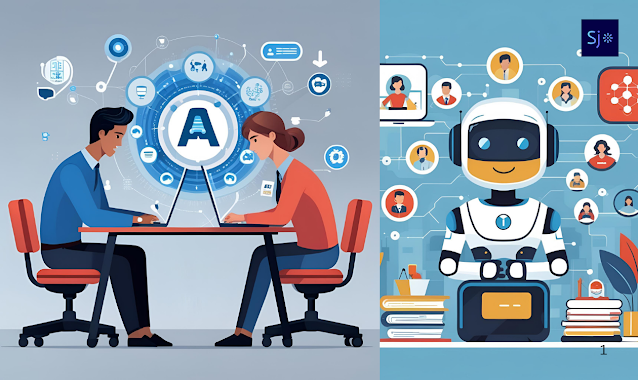Introduction: Is AI Taking Over Our Jobs?
Imagine waking up and realizing that your job is now being done by a machine. Sounds scary? This is not just a sci-fi scenario anymore. Artificial Intelligence (AI) is transforming how we work—and it’s happening fast. From factories to offices, AI-powered systems are performing tasks faster, cheaper, and often more accurately than humans. But does this mean mass unemployment, or are new opportunities on the rise?
In this article, we break down the reality of AI’s impact on employment, covering both the risks and the new doors opening for workers globally.
What is AI and How Is It Used in the Workplace?
AI, or Artificial Intelligence, refers to machines designed to think and learn like humans. These systems can perform tasks such as analyzing data, recognizing speech, making decisions, and even learning from experience.
Common Applications of AI in Jobs:
- Customer Service: Chatbots and virtual assistants
- Healthcare: AI diagnosis and treatment recommendations
- Manufacturing: Smart robots on production lines
- Finance: Fraud detection and automated trading
- Marketing: Predictive analytics and personalized ads
Automation vs AI: What's the Difference?
- Automation refers to machines performing repetitive tasks based on rules.
- AI involves decision-making, learning, and adapting to new situations.
For example, a conveyor belt is automation. A robot that sorts products by learning from errors is AI.
Jobs Most at Risk Due to AI and Automation
Some jobs are more vulnerable due to their repetitive or rule-based nature.
Jobs at High Risk:
- Data entry clerks
- Telemarketers
- Cashiers
- Assembly line workers
- Fast food preparation
According to a study by Oxford University, up to 47% of U.S. jobs could be automated in the next 10-20 years.
Jobs Created or Transformed by AI
Not all the news is bad. AI is also creating jobs that didn’t exist before and transforming current roles.
Emerging Job Roles:
- AI/Machine Learning Engineers
- Data Analysts
- Robotics Technicians
- Cybersecurity Experts
- AI Ethics Consultants
Many traditional jobs are evolving. For example, marketing managers now rely on AI tools for customer insights.
The Future of Work: Human + AI Collaboration
Rather than completely replacing workers, AI is increasingly seen as a tool to augment human skills.
How AI Enhances Jobs:
- Faster decision-making through predictive analysis
- Better customer experience with personalized services
- Improved productivity by automating repetitive tasks
This human-AI partnership allows people to focus more on creative, strategic, and emotional intelligence-based tasks.
Skills You Need to Stay Relevant in an AI World
To thrive in an AI-powered workplace, workers need to adapt.
Top Skills for the Future:
- Critical thinking and problem-solving
- Emotional intelligence
- Digital literacy
- AI and data basics
- Creativity and innovation
- Lifelong learning mindset
Many online platforms like Coursera, Udemy, and LinkedIn Learning offer affordable AI-related courses.
Industries Most Impacted by AI
High Impact Industries:
- Manufacturing – Automated assembly lines
- Transportation – Self-driving vehicles
- Retail – AI-powered recommendations and inventory management
- Healthcare – Diagnostic tools and robotic surgeries
- Finance – Algorithmic trading and fraud prevention
These sectors are rapidly integrating AI, altering job profiles and skill needs.
Global Impact: AI and Employment Around the World
- Developed Nations: Faster adoption, more job transitions
- Developing Countries: Risk of job displacement due to fewer safety nets and retraining options
Governments and companies must work together to support transitions through re-skilling programs, digital education, and social safety nets.
Ethical Concerns: Is AI Fair for Workers?
- Bias in AI algorithms can affect hiring decisions
- Job displacement without support may increase inequality
- Data privacy is a growing concern
Fair AI use demands transparency, regulation, and human oversight.
Action Plan: Preparing for the AI Job Revolution
For Individuals:
- Learn new skills online
- Stay updated on tech trends
- Network with professionals in growing fields
For Companies:
- Invest in employee training
- Use AI responsibly and transparently
- Balance automation with job creation
For Governments:
- Create policies for AI ethics
- Fund public retraining programs
- Ensure fair access to digital tools
Conclusion: Adapt to Thrive
AI is reshaping the job market—but it’s not all doom and gloom. Yes, automation will replace certain roles, but it will also give rise to new opportunities and more meaningful work. The key is adaptability.
Note : Invest in learning, embrace AI as a tool, and stay agile. That’s how you future-proof your career in a world where AI is here to stay.


Post a Comment